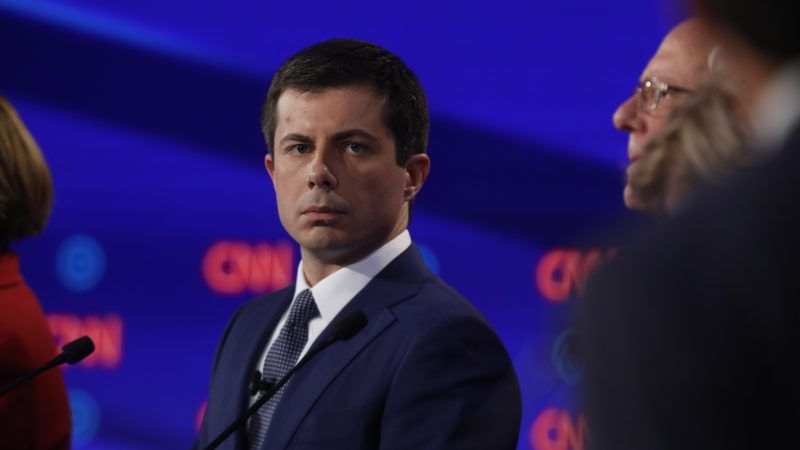Pete Buttigieg's Plan to Unionize Gig Economy Workers Will Destroy the Gig Economy
"A gig is a job and a worker is a worker," Mayor Pete said.

South Bend Mayor Pete Buttigieg reiterated his vision to let gig economy workers unionize during the second round of Democratic primary debates on Tuesday night in Detroit.
"There are people in the gig economy who go through more jobs in a week than my parents went through in their lifetime," said Buttigieg to a round of applause. "It's why I've proposed that we allow gig workers to unionize because a gig is a job and a worker is a worker."
The remark reflects one of his recent proposals, which centers around "empowering workers in a changing economy" by increasing workplace protections, particularly for those who choose to work in the gig economy. As it stands, Buttigieg sees their status as too precarious.
But in order to successfully execute that plan, the presidential hopeful would need to ensure those workers are reclassified as fully-fledged employees, as opposed to independent contractors. That may be a tough sell: The National Labor Relations Board (NLRB) already ruled that Uber drivers cannot unionize because they are independent contractors, and the Department of Labor similarly declined to classify gig economy participants as employees. Both agencies said that those individuals are free to work when they please, can set their own hours when it best suits them, and are permitted to work for competing companies. Those criteria, and several others, make them contractors.
Changing their employment status would be fairly devastating to the gig economy business model that makes that work possible and those services accessible and affordable. Mandating employee status for all workers would allow them to unionize, yes, but it would also require those app companies to provide benefits and supply workers with a minimum wage.
Buttigieg says that would be a good thing. But such a move would send labor costs through the roof, catalyzing a significant spikes in prices—something that will disproportionately affect low-income individuals, who benefit immensely from access to these services. Higher prices would reduce demand and make such jobs less available. In New York City, 90 percent of app-based drivers are first-generation immigrants, a testament to the opportunity such apps give the disadvantaged. With Buttigieg's plan, those opportunities would surely shrink.
And as Reason's Nick Gillespie points out, private sector union participation is small, a trend that's unlikely to reverse itself. As the country continues to move away from industrialized labor, so, too, have workers moved away from unionization.
Editor's Note: As of February 29, 2024, commenting privileges on reason.com posts are limited to Reason Plus subscribers. Past commenters are grandfathered in for a temporary period. Subscribe here to preserve your ability to comment. Your Reason Plus subscription also gives you an ad-free version of reason.com, along with full access to the digital edition and archives of Reason magazine. We request that comments be civil and on-topic. We do not moderate or assume any responsibility for comments, which are owned by the readers who post them. Comments do not represent the views of reason.com or Reason Foundation. We reserve the right to delete any comment and ban commenters for any reason at any time. Comments may only be edited within 5 minutes of posting. Report abuses.
Please to post comments


Didn’t we just see this article?
The problem is not the government deciding that gig workers are not employees and thus can't unionize. The problem is government sticking its nose in anywhere in that sentence.
It's nobody's business how the government classifies jobs as employees or contractors.
It's nobody's business if groups of people want to join together in unions, or any other group by any other name.
The government offers additional protections for unionized workers, such as enforcing collective bargaining agreements, and making it illegal to fire workers for joining a union. But those protections only kick in if the government recognizes the employees as employees and the union as a union
So yes, Uber drivers and the like can join together and call themselves a union, but Uber would then also be free to ban the so-called union members from their app, or refuse to collectively bargain with them. Without force of law its all just words
I spend a lot of time thinking about comments to write - I probably spent a couple of micro-seconds before I started typing this one.
The pete is right - that sort of effort should not go unrewarded!
Who's with me? Who has a name and acronym for our new union?
The Gag-Your-Choice Union -- naw, all unions do that.
The Buttinsky Union -- ditto.
Gag-Your-Gig?
"That may be a tough sell:"
Apparently you're not paying attention to California law. A recent case has held that independent contractors (for all intents and purposes) no long exist in California. By definition (according to the CA Supreme Ct in the Dynamex case), an independent contractor must "perform work that is outside the usual course of the hiring entity’s business" or otherwise be treated (and taxed, and regulated) as an employee. Goodbye independent Uber drivers, and hello labor unions - which was likely the intent of the plaintiffs in this case to begin with.
Uh, "no LONGER exist . . ."
To belabor the obvious - - -
The point of his proposal is to eliminate any individual choice and force people to work according to government edicts.
Buttpig wants to unionize the gig economy workers?
Sure thing, Einstein.
How did unionizing the auto workers work out for Detroit?